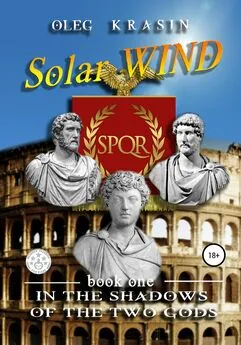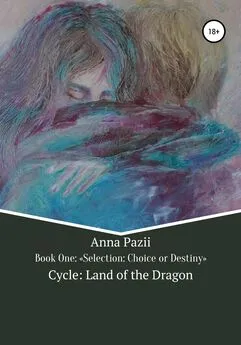Oleg Krasin - Solar Wind. Book one
- Название:Solar Wind. Book one
- Автор:
- Жанр:
- Издательство:неизвестно
- Год:2022
- ISBN:нет данных
- Рейтинг:
- Избранное:Добавить в избранное
-
Отзывы:
-
Ваша оценка:
Oleg Krasin - Solar Wind. Book one краткое содержание
MARCUS AURELIUS ANTONINUS
The emperor-philosopher, for a moment, thanks to him, the world was governed by the best and greatest man of his age.
Solar Wind. Book one - читать онлайн бесплатно ознакомительный отрывок
Интервал:
Закладка:
“What did you see, little Verus?”
And Marcus unsophisticated told the emperor about these feasts. Hadrian looked intently into the boy's lively eyes, which did not lie, he saw it, and he liked the honesty of little Annius. That's probably why he nicknamed him “Verissimus.” 13 13 Verissimus (Latin) is the truest, true.
However, this acquaintance with the promising little rider was interrupted for a long time—the emperor was delayed by other countries, distant cities, strangers, and new impressions.
Hadrian, of course, heard a variety of rumors, gossip from Rome, including about Marcus Verus. All the same Heliodorus told how the young Marcus, along with other priests, threw wreaths on a pillow with the image of Mars, and if the priests' wreaths fell somewhere, then Marcus definitely fell on the head of the war god.
“Perhaps our priests' hands were shaking after the wine was drunk,” the emperor observed sarcastically.
But this event once again confirmed Hadrian's conviction in the benefits of horoscopes—because the horoscope left no doubt about the purpose of Marcus, he was expected to be granted honorable and important appointments, and, of course, the highest office in Rome.
“So, the gods favor our Marcus, our Verissimus?” Hadrian asked, stroking the silky skin of the greyhound he had taken with him to hunt. They were in Greece, near Athens. From the imperial palace the rocky bare mountains could be seen, the tops of which clung to lonely clouds.
“Yes, Emperor!” Heliodorus nodded his head. “Everyone took what had happened as a sign sent by the gods.”
“Perhaps, perhaps!” Hadrian muttered thoughtfully, and then quoted with pathos, “The throne and the power over the country are set by this fortune-teller.” 14 14 Annius "Annales,” book 1., (translated by S.A. Osherov), Chrystomatia on early Roman literature, Moscow, 2nd edition, publishing house "Greek-Latin Cabinet of J.A. Shichalina," 2000, p.35
He cast a fleeting glance at the secretary.
Heliodorus drew his attention to his face, smiled encouragingly, and knowing Hadrian's vanity, decided to play along.
“Caesar, these lines from Virgil?
“No, Heliodorus. How can you not study Annius, his Annales? Every citizen of Rome should know the poem by heart. It is about the iron character of the Romans and their indestructible greatness. Today, call reader Philip! In the evening I intend to listen to an excerpt about the dispute with King Pyrrhus, in which the speech of Appius Claudius the Blind is heard. It is there in those verses,” he said. “You can join in.”
“I'll take it for honor, Caesar!”
“Let you know that I put Ennius above Virgil, who also has talent, but is undisputed, for Virgil took a lot from Annius, his style, his expressions, his words. And Ennius plays “The Abduction of the Sabines”? That's what happens when a man is guided by a great genius.” 15 15 Genius is the spirit of the patron saint of men.
The emperor spoke with enthusiasm. The red toga slid off his shoulder, and the edge of the white tunic appeared, on which the attentive secretary saw a drop of dried blood. Only yesterday there was a lot of bleeding coming from Hadrian's nose, which could hardly be stopped, but today he felt noticeably better. The bleeding frightened him, and over time only intensified.
Returning in the spring in Tibur, Hadrian seriously thought about a successor. It was necessary to rush with this because the bleeding did not stop.
And yet… the horoscope said one thing, but Hadrian's will could do another thing, he was very conceited, proud, and if the horoscope said “yes,” he could say no, not caring about the planetary prophecies, the opinions of the priests or those of the boy's relatives.
Oddly enough, he often wanted to go against the horoscope or general judgments to show everyone that nothing is just given. Let them suffer, let them doubt their hopes, because when they do not come true, they beat more painfully on the heart than direct deception. He, although he leaves a bitter residue in the soul, but not so destructive.
Here, for example, Sabina expected something completely different from him, but her expectations did not materialize, and she was showered in her eyes, as old buildings were crumbled from time to time. Apparently, because the wrinkles crossed her face, it seemed to Hadrian an ugly crack on the old walls. It jarred him, a lover of all graceful things, for old age is ugly in all manifestations.
Now Hadrian himself decided on whether to appoint Marcus Annius Verus as his heir or not. Behind him was the final word, as for the formidable and all-seeing Jupiter. In fact, he, Hadrian, was a god still living among the living. But one day his time would come and then his soul from the flames of the funeral fire would soar to the sky with the freedom of an eagle. 16 16 During the burial of the Roman emperors in the sky released an eagle, considered a bird of Jupiter.
How to strengthen the dynasty
“Oh, he's a monster, I assure you! A real monster!”
Empress Sabine angrily squeezed bloodless thin lips, frowned her eyebrows, and tried to give her face a neutral, detached expression, but she did not always succeed. And now she couldn't cope with herself. Evil tears rolled into her eyes, and dry, heart-weeping sobs came up to her throat.
She reclined on the bed—under her back the slaves slipped a few pillows for convenience—talking to her longtime friend, Marcus's mother, Domitia Lucilla. The bed was small, with elegantly curved wooden legs, decorated with bronze. Domitia was lying opposite exactly the same. The space between them was occupied by a small table on which there was a tray of fruit and a jug of wine.
In the spacious room the hand of the Empress was felt—on a large stone floor stretched a bright woven carpet, brought from distant China through Parthia, and along the walls in the niches were busts of Greek and Roman writers; Sabina was fond literature. Here were Virgil, Homer, Catullus, Horace, but there was no Ovid, as he was never forgiven by Emperor Octavian Augustus.
It was a hot, dry summer on the street, so slaves stood near her bed and the bed of Domitia, fanning the women with large fans fashioned from long ostrich feathers. They were almost alone in the Palatine Palace, except for the slaves, but who would think of them. Hadrian spent all his time in Tibur, in his newly built huge villa and did not look into the palace.
In the far corner of the hall at the table was Marcus. He read Cato's 17 17 Marcus Porсius Cato the Elder (234-149 BC) is a well-known Roman politician and writer.
book in a position assigned to him by the grammar teacher of Apollonius, who had recently begun to teach the young man.
The Empress was talking about Hadrian. He had long been the subject of her conversations, and to the curiosity or indignation of visitors, she always spoke about him badly, painting her stories in gloomy tones, attributing her barrenness to Caesar’s dirty passions and vices. Visitors invited to Sabine's palace, her clients and freedmen, for the most part, were afraid of these conversations, because the well-wisher could convey to Hadrian that someone—patrician or rider—listens favorably to all the anger that the disgraced empress thrust on Caesar.
Domitia Lucilla also listened with concern to Sabina's lengthy dialogues, but she was hesitant to interrupt it. After all, Sabina was their patron at the court, it was she who helped Marcus attain a proper place in the heart of the Roman ruler. She supported with her advice, connections, influence, the Annius family all these years, and Domitia Lucilla considered herself indebted to her.
Sabine wore a pink tunic, a rich pearl necklace around her neck. Her hands had bracelets wrapped around them like silver snakes. Fascinated by the conversation, she casually touched the pearls around her neck with her fingertips, sorting bead after bead. Domitia Lucilla was dressed more modestly—in a faded blue tunic with a long handkerchief draped over the top and almost no jewelry.
“Because of him, I remained barren,” the Empress continued. “I wanted children, but judge for yourself how to give birth from such a despot?”
“But isn't Hadrian better than Nero or Diocletian, whom the Senate refused to deify?” tactfully objected to Domitia. “He likes music, poetry, he's a famous connoisseur of the arts. It seems to me that the soul that loves the graceful is not subject to vile motives.”
“You're wrong, Domitia! A man inspired by the bare ass of young men cannot be sublime.”
Domitia looked away in embarrassment and looked at the slaves. Two swarthy black Africans continued to wave unflappably. Their skin glistened with sweat, and as if the sea waves rolled muscles on their hands. They probably didn't understand Latin. Marcus's mother calmed down a little, and Sabina chuckled:
“Do you think I'm talking about his lover Antinous, whom the gods took away from him? No? It's in the past. But the emperor likes to go to the thermae to the barbers and watch as the young men, earning a living as a prostitute, shave their ass.”
“Ass?” Domitia said in confusion. “Why is he looking?”
“He finds a strange, perverted inspiration in it, and then writes poetry. However, they do generally turn out quite decent and can be read in society.”
Sabina paused and made a sign for one of the slaves. The slave quickly came up with a tray on which there were glasses of cold wine diluted with water.
“And such a man—is my husband!” the Empress remarked, drinking wine, though without the former hysterical break. “And what have you, dear Domitia? You haven’t found a mate yet, after all, enough time has passed since Annia’s death?”
“No!” Domitia shook her head. “I don't think I need anyone. I give all my strength to the correct upbringing of my son, teach him the old Roman traditions. It's a good thing his great-grandfather Regin helps me with that.”
“But, right, are you entertained with slaves? Let's admit it!” Sabina smiled, believing that the topic with Hadrian could be closed and move on to the little things that were sweet for the woman's heart.
In response, Domitia also smiled.
“How can I not! Doctors advise sleeping with men for health and hygiene purposes.”
She looked involuntarily again at the sturdy muscular slaves, diligently doing their job. The fans moved, not ceasing, a pleasant breeze invigorating the warmed skin. After following her gaze, Sabina chuckled:
“A little later, let's go to my pool and cool down. And we'll take these with us to have fun.”
Marcus, who was fascinated by reading, did not pay attention to the conversation between his mother and the Empress. His table was near the bust of writer and stoic philosopher Lucius Seneca. The flabby, white, marble head of Nero's tutor didn't like Marcus. It was a cold lifeless face, empty eyes without pupils. He tried not to look at him, for the thought of how he could someday become the same, frozen in marble or bronze with dead empty eyes.
Over the years he had grown, transforming into an angular, clumsy boy with a long, pointed chin and curly hair. Only his eyes, the big convex eyes, the living soul, in which curiosity did not disappear, remained the same.
Fragments of words from the conversation between the mother and the empress reached him, but he did not attach special importance to them. The tangled relationship with Sabina brought their family a benefit that could be wisely applied by climbing up the imperious ladder of Rome. Priest, questor, prefect, consul. Life seemed straight, like the Appian Way near Rome, it led to the due respect, fasting, and glory of those who impeccably followed Roman laws.
Читать дальшеИнтервал:
Закладка:










